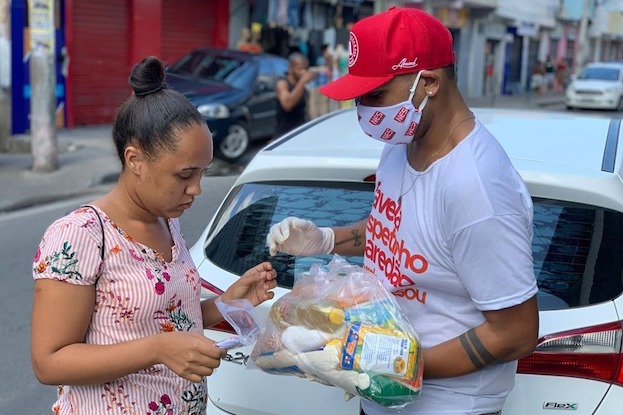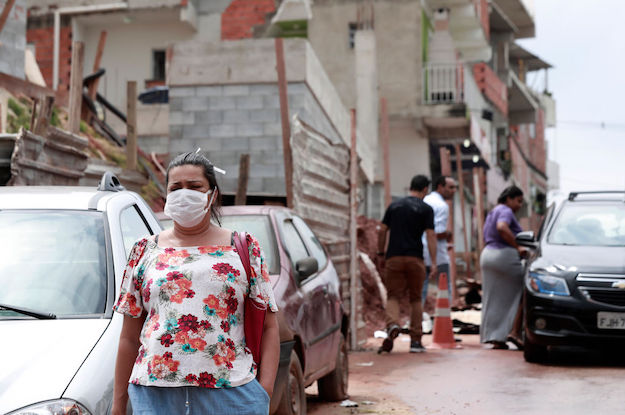“The word ‘favela’ has not been heard from any government official,” Gilson Rodrigues, a community leader in Paraisópolis, São Paulo, said during a Facebook Live in March. “We need to organize and protect ourselves.”
Today, it’s clear Paraisópolis rose to the challenge: The community has 420 volunteers checking on neighbors, a nearby school was retrofitted as a shelter for people to isolate with a degree of space, and even a dedicated medical team and ambulances were hired to look after the sick.
In favelas across Brazil, community activists and resident associations have sprung into action to battle the pandemic, knowing that waiting for the state to help them may mean a death sentence. Not every neighborhood has the resources of Paraisópolis, a community of roughly 80,000 people surrounded by some of São Paulo’s wealthiest areas. But they have still helped blunt the impact of a pandemic that is now spreading at alarming speed, making Brazil one of the hardest-hit places in the world.
The solutions are often extraordinarily creative, with residents creating new apps to battle fake news on COVID-19 – a major problem – or hanging posters with messages like “Would you rather be here or in a cemetery?” in order to encourage social isolation.
“We answer to the deep gap that exists between the state and our communities,” Isabela Souza, director of Observatório de Favelas, told AQ. “But the speed with which we all organized this time around has been impressive.”
“The police and the press only come here if there is a murder or a shootout,” said Jefferson Borges, 29, from Nordeste de Amaralina in Salvador, Bahia, an area with close to 200,000 residents. “We can’t wait for help.”
Food at the top of the list
“Urgent! People running out of food is already a reality here!” René Silva, 25, founder of Voz das Comunidades, pleaded on Twitter in March.
Based in the Alemão complex of favelas, with close to 140,000 residents in northern Rio de Janeiro, Silva and other local activists convened a crisis committee. Using social media to spread the word, activists started collecting donations in kind and cash. Dozens of volunteers showed up to prepare baskets with food and cleaning products and then crisscross the maze of stairs and narrow alleys daily to help vulnerable families.
Up to May 13, they alone had delivered, door-to-door, 4,800 baskets of food and cleaning supplies, 4,600 gallons of water and 177 bottles of alcohol in gel, the main hand sanitizer used in Brazil.
In Santa Marta, a community of 6,000 in Rio’s south zone, Itamar Silva turned his community organization Grupo Eco, which provided summer camp opportunities for the children in the favela, into an emergency operation. “We’re raising funds to provide food and cooking gas for 50 vulnerable families, which is what we can afford,” Silva told AQ.
Crowdfunding has become a lifeline for many projects like Favela Central CUFA, which is distributing 120 reais ($25) food vouchers for single mothers, the “Adopt a Cleaning Lady” campaign to help domestic workers that were let go without pay, as well as residents associations that are buying and distributing food.
The mobilization is impressive, but the needs are dire, and continuous. “I get requests for help even from residents of favelas in other states,” Borges said. “If they go out to try to sell something on the streets, there is no one to buy. People are desperate.”
Unfortunately, the pandemic did not change, or lessen the cycle of violence to which many favela residents are subjected. A recent police operation against drug traffickers left 13 dead and bodies in plain sight on the streets of Alemão complex. At another populous neighborhood further north in Rio, a resident who didn’t want to be named told AQ the militia in charge didn’t allow residents to organize food drives – and continues to charge them monthly “dues” for protection.
Battling fake news – and the president
With no official public health campaign and a barrage of fake news being shared on TV, social media and the radio, local groups are trying to cut through the noise to keep their fellow neighbors informed. Souza’s Observatório de Favelas, a 19-year-old organization founded by first-generation college graduates from Maré Complex, in Rio, has focused on creating social media memes and cards that can be easily shared and replicated, with topics like tips to wash hands if you don’t have running water.

“Policy makers and government officials don’t know what reality is like for poor communities so their policies and messages stop short of reaching the most vulnerable,” said Souza.
Voz das Comunidades created an app dedicated to COVID-19 news and information catered to favela residents. “We noticed that the flow of fake news about the virus was increasing,” Silva said. “Our whole team is focused on fighting the misinformation that is spreading in favelas.”
Yet across the country people are confused on whether to choose the message from their local leaders asking for isolation, or President Jair Bolsonaro, who consistently downplays the pandemic and urges people to go back to normal life.
“At first people were staying at home,” Borges told AQ, “but then they see the president out and about and they tell me: Why should I stay home if he doesn’t?”









